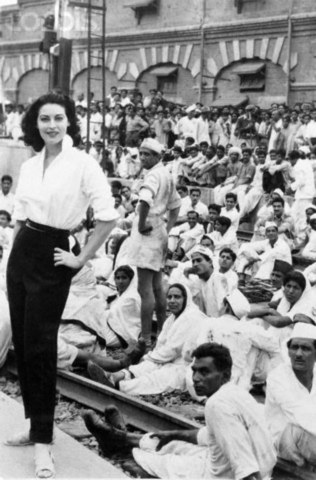 This photo was taken on April 22, 1955 and it shows American actress Ava Gardner at Lahore Railway Station. She was in Lahore for the filming of Hollywood Movie ‘Bhowani Junction‘. When Ava came to Lahore, there was only one reasonable hotel in Lahore. It is still there – Falletis. The suite in which Ava stayed has been named after her – “The Ava Gardner suite”. In it’s lounge one could see a beautiful large size, black & white portrait of Ava Gardner smiling.
This photo was taken on April 22, 1955 and it shows American actress Ava Gardner at Lahore Railway Station. She was in Lahore for the filming of Hollywood Movie ‘Bhowani Junction‘. When Ava came to Lahore, there was only one reasonable hotel in Lahore. It is still there – Falletis. The suite in which Ava stayed has been named after her – “The Ava Gardner suite”. In it’s lounge one could see a beautiful large size, black & white portrait of Ava Gardner smiling.
‘Bhowani Junction‘ is the name of a novel by John Masters which came out in 1952. 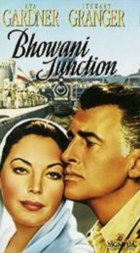 In mid 50s Hollywood decided to make a movie out of it. The movie is set amidst the turbulence of the British withdrawal from India. It is notable for its portrayal of the Eurasian (Anglo-Indian) community, who were closely involved with the Indian railway system. The film was directed by George Cukor, and was shot on location in Lahore, Pakistan. It starred Ava Gardner as Victoria Jones, an Anglo-Indian nurse in the British Army, and Stewart Granger as Colonel Rodney Savage, a British army officer.
In mid 50s Hollywood decided to make a movie out of it. The movie is set amidst the turbulence of the British withdrawal from India. It is notable for its portrayal of the Eurasian (Anglo-Indian) community, who were closely involved with the Indian railway system. The film was directed by George Cukor, and was shot on location in Lahore, Pakistan. It starred Ava Gardner as Victoria Jones, an Anglo-Indian nurse in the British Army, and Stewart Granger as Colonel Rodney Savage, a British army officer.
I found following review of movie plot at The Internet Movie Database
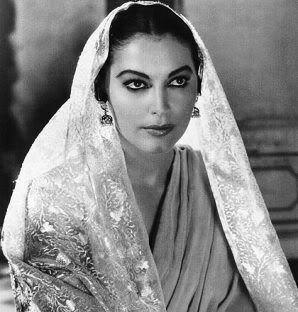
The town of Bhowani is a railroad junction and both the Congress Party and the Communist Party are doing all kinds of sabotage to help the British quickly get out of India. Of course each is doing it for their own reasons. In the movie, two people who may have given the outstanding performances of their careers are Ava Gardner and Bill Travers. Both play bi-racial people who don’t fit in either society. But they react differently. Gardner is going through a whole lot of angst, really seeing both the British and Indian point of view.
Bill Travers is the railroad station manager and his whole life is his job. He focuses narrowly on that and his tunnel vision leaves him oblivious to the momentous changes around him. Except for the fact that when the British leave he might lose that little piece of authority where he is, that which gives him stature in the Raj society.
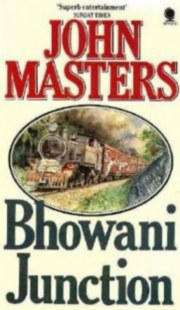 Photo to the left is the book cover image of the novel ‘Bhowani Junction’.
Photo to the left is the book cover image of the novel ‘Bhowani Junction’.
In the movie, the issues are complex, but in the hands of a great director like George Cukor the characters and their struggles become real and even more important, the audience becomes interested. Stewart Granger who was the British Colonel in charge of the whole mess in Bhowani, said that Bhowani Junction was one of the few films he was really proud to be associated with. He has a struggle to, he really does see the Indians as human beings and not just “wogs.” He’s quite knowledgeable about their customs and at one point utilizes that knowledge to unjam that railroad terminal.
Following two images are the movie posters of Bhowani Junction. In the first poster below one can see the wordings ‘Filmed in Pakistan’ right under the title in yellow which says Bhowani Junction.


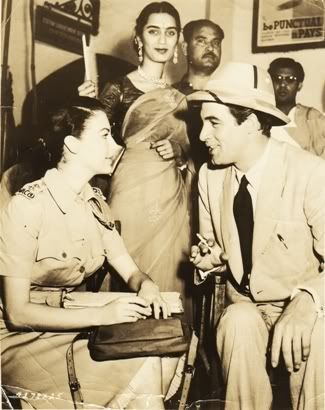 We are especially proud to feature the photo to the left from Bhowani Junction filming days. It comes from the personal collection of Zohra Arshad Mahmood, who is seen standing in this photo. Photo credits go to her son and my friend Imran Mahmood, who generously agreed to share this photo with us.
We are especially proud to feature the photo to the left from Bhowani Junction filming days. It comes from the personal collection of Zohra Arshad Mahmood, who is seen standing in this photo. Photo credits go to her son and my friend Imran Mahmood, who generously agreed to share this photo with us.
Pakistan’s famous writer Mustansar Hussain Tarar‘s has mentioned atleast at two places and dedicated a whole chapter in his book ‘raakh’ on the making of Bhowani Junction. While I could not tell if all of account is real or fictional, there is certainly some degree of truth to it.
Photo Credits:
(1) Bettmann/Corbis.com
(2) Ravindra Bhalerao
(3) The Daily Telegraph




















































Hi,
This is a great post.I saw this movie in 1980 with my father and still have in my collection in Lahore.As per my father who was a student of GC at that time,it was a great event in Lahore and people used to stand outside Flattis Hotel to have a glimpse of these famous actors.Those were the good old days of lahore,which live in our memory only.I remember in our school St.Anthonys there were quite a few anglo-indian staff members.But that lahore and generation is lost,now what we see is that there is an onslaught on lahore from people of villages and small cities who are totally ignorant of the cultural background and traditions of this great city.
and are bent upon transforming our great city into a big sized slum full of uneducated people who are wild and intolerant to everybody else.
I hope that the remaining lahoreites retain their traditional values and pass them on to their future generations.
Dr.Daniyal Nagi
Ireland
This is a great post, however it is sad to note that the man who actually was the Production Manager of this film in Pakistan at the time is no where to be mentioned. He was a pioneer of his time. My father, AH Rana was the Production Manager and co ordinated all the Lahore station scenes. It was by chance that I stumbled upon your site, as I was looking for pictures of George Cukor in Lahore, possibly with my father but I am glad that I found you and can contribute my post on your site. Many Thanks
@Owais Mughal,
for info, the ” Iqtibas ” from Mirza latif Baig’s
novel (1962 ?) ” Railway line ka haseen hadisah ”
was a great source of inspiration from “erotism ”
a l’epoch.
I can’t imagine to recall that years ago i was at Lahore railway station and my father told me at that time of filming of this movie.My father i think, was in studying in college.What a world and time is passing away.
@ Owais Mughal,
ham nay aik nayhayat khubsurat shair in Hasinah
ki nazr kia tha, wo ghaib hogaya hay, agar apko mil
ja’aiy to bra,aiy meharbani usay dobarah post kardein,
nawasish hogi,
Ava Gardner kay qadawar wajood pay yeh haseen
chehra, wo ankhain , rasilay hont, aik panch sal kay
bachay ko bha gai thi, aur wo hamein bohot achhi
lagti thein, wo agar mujhay apni gaud mein latien
to meray to waray niaray hojatay, unki perfume nay mujhko
madhosh kia rakha tha, jab bolti to muh say moti
jkhlaktay thay, chalti thi to zamin uth uth kar qadambosi
karti thi, Hamari Umr us waqt 5 saal ki thi, laikin dil
humara un mein ja atkaa tha, unki muskurahat, ankho kays
do pattioin kay dayeron say adh-kholi ankhon say meri
traf dekha to mujhay bhagna para, lekin wo mujh ko
ghaseet lay aein and zordar bosah day dala, kiya perfume
thi wo kabhi bhi bhula ne saka, namaloom Khudah nay
kesay usko banaya tha is paripaiker ko husn ki devi ko
Mushorahat haseen, ankhein nashili, hont marmarin
Kulayh par aik hath rakhay howay, muskan labbon par,
ji chata tha ke bosah lay lein, magar zalim dunya nay
honay ne dia ! wah ray zamanay
Husn ko chand bhi sharmatah hay
teri surat nay ghazab dhaya hay
RK